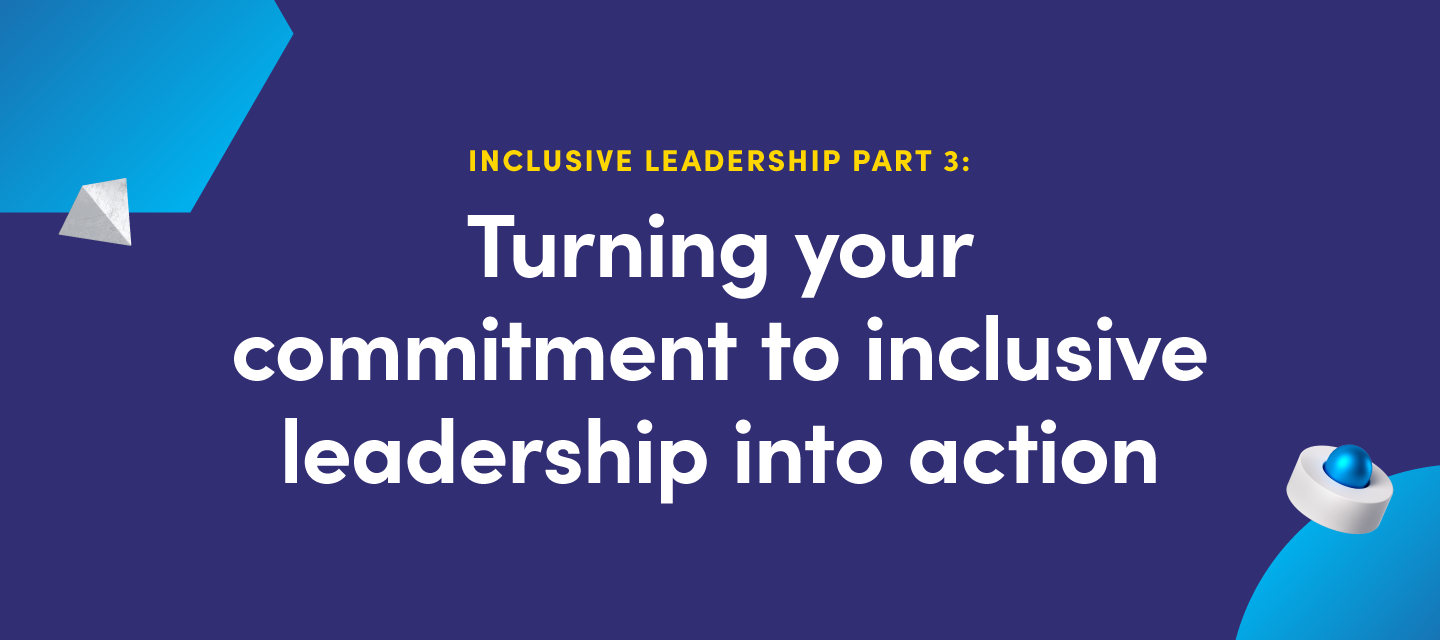Becoming an inclusive leader is a lot like planting a garden. Just as plants need to be watered, your team needs daily reminders and examples of what it means to be inclusive and diverse, and why it matters. With consistent care and attention, you’ll eventually harvest awesome results.
All of this effort and pay-off starts by planting a seed. When we talk about inclusive leadership, that seed is a commitment. Nothing else is possible without a commitment to building inclusive behaviours within your team.
In this article, I’ll explore how to make a commitment to inclusive leadership, how to turn that commitment into action, and how to stick to your plan.
What does a commitment to inclusive leadership look like?
There are six key characteristics that inclusive leaders possess. You can check out a list and description of the traits back in post one of this series. Making a commitment is an essential first step to strengthening these characteristics.
But what does making a commitment mean? There are three ways managers can make a meaningful commitment to growing inclusivity within their teams.
-
Understand the business case: I touched on this subject in post one of this series, but it should be emphasized—inclusive leadership can’t be something you do just because it’s the right thing. You have to understand why it’s crucial to your job and the success of your team. This will help you establish inclusive leadership as a formal practice within your department and company. Check out some tips in this post on how to make a business case for inclusive leadership.
-
Create goals and a roadmap to success: If you want to do a project at work, you create an official plan for it. Making a commitment to inclusive leadership should be no different. For example, you might have a goal of raising your cultural intelligence. To do that, you might want to read more about managing different personalities. The final step is to create milestones for your strategy, such as reading one article on management per day.
-
Have a conversation with your team: Accountability creates the strongest commitments. To lead inclusively, you need to be accountable to those you manage. Tell your team about your goals for becoming a more inclusive leader. Explain that you need their help and that you are open to discussing ways in which you could do better in your interactions with them.
Turning your commitment to inclusive leadership into action
There’s little value in a commitment without action. Here are a few ways to incorporate your commitment to inclusive leadership into your day-to-day as a manager:
-
Create inclusivity guidelines for your team: Formalizing your plan is key to creating an inclusive environment for your team. This can be as simple as writing down a handful of principles to follow, such as designating a certain amount of time each week to discuss inclusivity. These guidelines embed inclusive behaviour in daily work practices and keep you accountable.
-
Share your progress: This is all about being a role model. Carve out five minutes in your day or week to tell your team about an interesting article you read about inclusivity. Email resources on diversity to your team that they might find useful. Talk about a lesson you learned and why you’ll be doing things differently because of it.
-
Educate others with empathy: We should always be working to catch exclusionary language and change the way we talk to be more inclusive. Empathy is critical in this process. If you experience this kind of language, pull the person aside and explain why this word or term might be exclusionary, how you learned this, and some alternatives. Work together to understand and develop a solution.
How to stay on track with your commitment to inclusivity and diversity
When we pursue a goal, we often take two steps forward and one step back. Sometimes, we stumble and fall. But it’s not about how often you make a mistake, but how you learn and grow from those mistakes. Here are a couple of ways you can get back on track when you veer off course in your quest to be more inclusive.
-
Admit mistakes and learn from them: Acknowledge when you haven’t lived up to your commitment. For example, listen to a team member if they tell you that something you said or did was not inclusive. Promise to do better next time. Then live up to that promise. This will bolster your own inclusive leadership and will be a great example for your team
Cancel culture vs. catch culture
Cancel culture is a way of punishing people for harmful and exclusionary behaviour. It often takes the form of public shaming and the person is given no opportunity to correct the behaviour being punished.
Cancel culture is rarely effective at changing problematic behaviour. Fortunately, there’s a much better alternative—catch culture.
Catch culture doesn’t gloss over someone’s action. It holds people accountable for what they say and do. The difference is in what happens next. Catch culture gives this person a chance to learn what they did wrong and how to improve. They are encouraged to catch themselves the next time. This gives them the opportunity to accept responsibility, learn, grow, and become an advocate for inclusivity themselves.
-
Double down on accountability: Talk to your manager, mentors, and the people you manage about your desire to discuss your progress, challenges, areas of improvement, and mistakes you might make. Dedicate time in one-on-one meetings to discuss this topic. Have a specific conversation starter for each discussion. For example, do you have any suggestions for how I can run more inclusive team meetings?
My final thoughts on committing to inclusive leadership
Making a commitment is the first thing you need to do as an inclusive leader. This commitment anchors all of your goals and actions moving forward. It might be a long journey to bring your commitment to life, but it’s well worth the results for yourself and your team.
If you want to chat about some practical strategies for becoming an inclusive leader and developing a diverse team, I’ll be leading a roundtable discussion just for members of The Fiixers on May 5, from 2-3 pm EST - register here.






